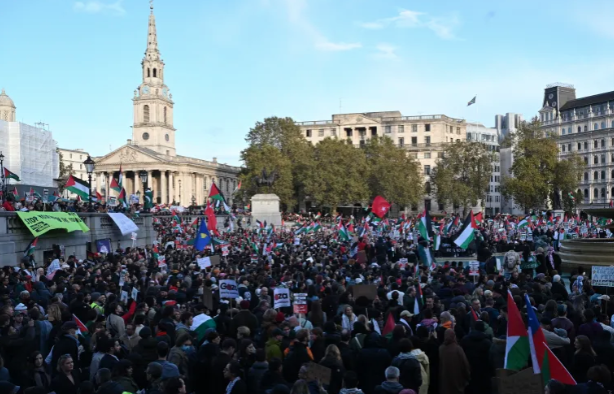Palestinian territories
Global Plea for Peace Amidst Israel War in Gaza

The Israel war casts its long shadow far beyond the scarred borders of Gaza, drawing a chorus of urgent appeals from the international community for a halt to the violence. From the capitals of Western powerhouses to the bustling streets of African cities, the common refrain is one of desperation—a collective call for a truce to stanch the bleeding of a land too long acquainted with the scourge of conflict. It’s a demand that pierces the veil of global politics, challenging leaders to heed not only the immediate agony but also the deeper, unresolved narrative of the Palestinian plight—a ghost that lingers obstinately at the feast of international affairs.
This global uprising, in its scope and fervor, harks back to the complex tapestry of Middle Eastern politics, a region where peace has often been an intermission between wars rather than a sustained reality. The roots of these demonstrations dig deep into the bloodied sands of Gaza, reaching into the fraught aftermath of colonial cartography and decades of Israeli-Palestinian animosity. Here, history is not merely a chronicle of events passed but a living, breathing leviathan whose shadow casts long and dark over the present-day tragedies.
In the heart of London, the din of impassioned protest brings the city’s relentless bustle to a reverent halt. It’s here, among throngs spilling onto the streets with banners unfurled, that a narrative of profound human connection emerges. One demonstrator, his hands gripping a sign as if to anchor him in a swelling sea of solidarity, articulates a truth that pulses through the crowd: “We are all Palestinians.” The phrase, uttered with the gravity of shared struggle, ripples through the assembled, a mantra of unity that binds disparate lives.
This is not merely a convergence of protest; it’s a mosaic of collective empathy and fervent dissent, a patchwork of individual stories woven into a larger human tapestry. The air is charged with an electric current of shared humanity, where empathy traverses oceans and continents, connecting the tribulations of a distant land to the heart of the metropolis. Here, the agony of one becomes the agony of all, galvanizing a global community that holds peace as its unwavering beacon.
In this spontaneous fellowship of strangers, the aspiration for peace finds its voice in a chorus as diverse as humanity itself, a testament to the belief that the tides of injustice can be turned by the relentless current of the human spirit’s better angels.
The scenes across these cities, dense with the masses and their placards, are not just a tableau of dissent but a mirror to the fractious international stance on the crisis. The United States’ funding of the Israeli military juxtaposed with the Biden administration’s calls for calm adds layers of contradiction and complexity to the narrative. The jarring visuals of destruction beamed across the world have spurred a movement, a collective push against the inertia of established political fronts, challenging the geopolitical chess game that seems to overlook the pawns: the people of Gaza.
The narrative promulgated by some world leaders seems to weave a different reality, one where calls for a ceasefire are muffled by strategic silences or tepid diplomacy. On the streets, however, a different story unfolds, one of a groundswell of public opinion that is no longer content with the status quo. This is no longer just a regional crisis but a global one, forcing a reevaluation of what is often painted as a binary conflict. It calls into question the very nature of international responses to such crises, probing the ethics behind the politics.
In the heart of these cities, one can almost touch the outcry. The streets of Paris are alive with the murmur of thousands, voices raised not in song but in an anthem of defiance. Banners ripple like waves in a sea of determination, each crest a demand for an end to violence. The throngs of Berlin carry within them the weight of history and a pressing need for its chains to be broken. Even as dusk falls, the protests do not fade into the shadows; instead, they glow with a resolve forged in the fires of shared humanity.
As this weekend’s global demonstrations wind down, the echoes of their chants linger in the air, a solemn reminder of the world’s interconnectedness in the face of suffering. The demands for an immediate ceasefire in Gaza, voiced by thousands from varied backgrounds, underscore the universal desire for peace. The question that hangs heavy is whether this collective call will catalyze the change needed to bring a respite to the beleaguered Gaza Strip and foster a dialogue towards enduring peace. Will the global outcry become a turning point, or will it be drowned out by the cacophony of ongoing conflict and political interests? Only time will tell if these global reverberations will shake the foundations of longstanding hostilities or if they are but the latest verse in the tragic ballad of Gaza.













You must be logged in to post a comment Login